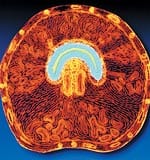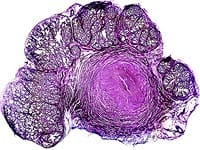Life Extension Magazine®
The African cherry tree, pygeum africanum, is an evergreen found at higher elevations across Africa. Its medicinal use dates to the 1700s, when tribes in southern Africa taught early explorers how to use the tree’s bark to treat bladder discomfort.1 Pygeum extract has been used in Europe to treat benign prostatic hyperplasia since the 1960s, and is currently the most commonly used therapeutic for this condition in France.2 Benign prostatic hyperplasia affects approximately 50% of men aged 51-60, and up to 90% of men over the age of 80. This condition causes the prostate gland to enlarge, constricting the urethra and making it difficult for the bladder to empty. Symptoms include reduced urine stream, frequent urination (especially at night), urinary urgency, leaking, and urinary retention. Severe benign prostatic hyperplasia can have serious long-term health effects, such as urinary tract infection, bladder or kidney damage, bladder stones, pain during sexual intercourse, and incontinence. Therapies to treat this condition include pharmaceutical drugs such as Proscar®, Hytrin®, and Flomax®, as well as non-surgical and surgical options. However, all of these remedies have associated side effects. Clinical studies suggest that pygeum bark extract is effective in reducing symptoms of benign prostatic hyperplasia, with few side effects.3,4 Benign prostatic hyperplasia’s cause is not fully known or understood. One theory is that the conversion of testosterone to dihydrotestosterone via the enzyme 5-alpha-reductase contributes to prostate enlargement.5 In addition, as men age, they often experience an increase in levels of estrogen relative to testosterone, indicating that estrogen may be involved in the development of this condition. In one study, extracts of pygeum and nettle root partially blocked the action of two enzymes, aromatase and 5-alpha-reductase, that are involved in the production of estrogen and dihydrotestosterone, respectively. Pygeum showed much higher efficacy at lower doses than did nettle root, but the combination of both herbs was significantly more effective than either alone in blocking the aromatase enzyme.6 How Does Pygeum Work?Pygeum bark contains numerous beneficial constituents, including phytosterols such as beta-sitosterols, which exhibit anti-inflammatory action by inhibiting the production of prostaglandins in the prostate. Other pygeum components in-clude ferulic esters, which reduce levels of prolactin (a hormone that promotes testosterone uptake in the prostate gland), and pentacyclic triterpenes, which inhibit an enzyme involved in inflammation and help reduce edema. Scientists believe that these phytochemicals work together to help counteract the structural and biochemical changes associated with benign prostatic hyperplasia.1,7 Pygeum may help to prevent the overgrowth of prostate cells that can contribute to benign prostatic hyperplasia. Research suggests that pygeum may do this by inhibiting basic fibroblast growth factor, a signaling biochemical involved in the development of benign prostatic hyperplasia.8 In a laboratory study, pygeum extract demonstrated an anti-proliferative effect on prostate cells derived from rats, which was in part mediated by inhibition of basic fibroblast growth factor.9
Enlargement of the prostate gland can obstruct bladder emptying, which can lead to cellular and functional changes in the bladder tissue. Studies of rabbits suggest that pre-treatment with pygeum helps to protect the bladder from developing contractile and biochemical dysfunctions induced by partial bladder outlet obstruction, possibly by protecting the bladder from ischemic injury.10,11 The investigators suggest that pygeum may work in both rabbits and humans to protect the bladder’s smooth muscle against cellular damage induced by obstructed flow.10 Reducing BPH SymptomsClinical trials suggest that pygeum can safely and effectively help to reduce the symptoms of benign prostatic hyperplasia. In a multicenter trial in Europe, 85 men with mild to moderate benign prostatic hyperplasia were given 50 mg of pygeum twice daily for two months. The study participants demonstrated a 40% decrease in the International Prostate Symptom Score, a subjective assessment of the severity of symptoms of benign prostatic hyperplasia. Furthermore, the pygeum-supplemented men reported a 32% decrease in frequency of nocturnal urination (nocturia) and a 31% improvement in quality of life. After the supplementation with pygeum ended, the patients were followed for one additional month. The benefits derived from the pygeum therapy continued even during this period without treatment, indicating a lasting therapeutic effect.12 In a larger placebo-controlled, double-blind study, 263 men received either 100 mg of pygeum or placebo daily for 60 days. The pygeum group demonstrated a 17.2% improvement in urinary flow, a 24.5% decrease in residual bladder volume, a 31% decrease in nocturia, and a 19.4% decrease in daytime urinary frequency. Overall, 66% of the pygeum group reported improvement, compared to only 31% of the placebo group.13 According to two separateliterature reviews, pygeum extract demonstrates statistically significant benefits for benign prostatic hyperplasia. The more recent review, conducted in 2000, analyzed studies dating from 1966 to 2000. In 18 randomized trials involving 1,562 men, pygeum provided significant improvement in combined outcome of urological symptoms and flow measures. Furthermore, men taking pygeum reported twice as much improvement in overall symptoms.3 An earlier literature review published in 1995 examined 12 clinical, placebo-controlled, double-blind studies, in which 358 patients received pygeum and 359 received placebo. Again, those consuming pygeum demonstrated statistically significant benefits compared to those receiving placebo.4
Additional Benefits of PygeumPygeum has also been used to treat inflammation of the prostate, or prostatitis. Prostatitis can occur due to infectious or non-infectious causes, and may cause symptoms such as urinary frequency, urgency, or pain. In a clinical trial, 47 patients with chronic prostatitis received 100 mg of pygeum daily for five to seven weeks. Eighty-nine percent reported a complete remission of symptoms.4 In another study, men with sexual dysfunction due to either benign prostatic hyperplasia or chronic prostatitis received pygeum extract (200 mg daily for 60 days) either alone or with anti-biotics. The men receiving pygeum bark extract experienced improved sexual function, even though there were no significant differences between hormone levels or nocturnal penile rigidity before and after therapy. Based on their findings, the researchers believe that pygeum may be beneficial to patients with sexual or reproductive dysfunction.14
Safety and DosageClinical trials conducted to date suggest that pygeum may greatly benefit men with benign prostatic hyperplasia through its ability to decrease nocturnal urinary frequency, lessen urinary urgency, inhibit prostate cell proliferation, improve patient quality of life, and reduce residual urine volume in the bladder. Furthermore, the data suggest that pygeum is safe and well tolerated. Most studies report no significant adverse effects of pygeum, though there have been rare instances of gastrointestinal disturbances such as diarrhea, constipation, and stomach pain. A clinical study reported a satisfactory safety profile after 174 men used 100 mg of pygeum extract once daily for 12 months. The same study demonstrated that adjusting the pygeum dose to 50 mg taken twice daily yielded similar efficacy as measured by quality of life, maximum flow rate, and International Prostate Symptom Score.15 Pygeum extract has no known interactions with drugs, herbs, or dietary supplements. The recommended dosage of pygeum extract is 100-200 mg per day. | |||||||
| References | |||||||
| 1. Simons AJ, Dawson IK, Dugunba B, Tchoundjeu Z. Passing problems: prostate and prunus. HerbalGram.1998;43:49-53. 2. Isaacs JT. Importance of the natural history of benign prostatic hyperplasia in the evaluation of pharmacologic intervention. Prostate Suppl. 1990;31-7. 3. Ishani A, MacDonald R, Nelson D, Rutks I, Wilt TJ. Pygeum africanum for the treatment of patients with benign prostatic hyperplasia: a systematic review and quantitative meta-analysis. Am J Med. 2000 Dec 1;109(8):654-64. 4. Andro MC, Riffaud JP. Pygeum africanun extract for treatment of patients with BPH: a review of 25 years of published experience. Curr Ther Res. 1995;56:796-817. 5. Bartsch G, Rittmaster RS, Klocker H. Dihydrotestosterone and the role of 5 alpha-reductase inhibitors in benign prostatic hyperplasia. Urologe A. 2002 Sep;41(5):412-24. 6. Hartmann RW, Mark M, Soldati F. Inhibition of 5-alpha-reductase and aromatase by PHL-0081, a combination of PY102 (Pygeum africanum) and UR102 (Urtica dioica) extracts. Phytomedicine. 1996;3(2):121-8. 7. Bassi P, Artibani W, De L, V, Zattoni F, Lembo A. Standardized extract of Pygeum africanum in the treatment of benign prostatic hypertrophy. Controlled clinical study versus placebo. Minerva Urol Nefrol. 1987 Jan;39(1):45-50. 8. Anon. Pygeum africanum (Prunus africanus) (African plum tree). Monograph. Altern Med Rev. 2002 Feb;7(1):71-4. 9. Yablonsky F, Nicolas V, Riffaud JP, Bellamy F. Antiproliferative effect of Pygeum africanum extract on rat prostatic fibroblasts. J Urol. 1997 Jun;157(6):2381-7. 10. Levin RM, Whitbeck C, Horan P, Bellamy F. Low-dose tadenan protects the rabbit bladder from bilateral ischemia/reperfusion-induced contractile dysfunction. Phytomedicine. 2005 Jan;12(1-2):17-24. 11. Levin RM, Das AK, Haugaard N, et al. Beneficial effects of Tadenan therapy after two weeks of partial obstruction in the rabbit. Neurourol Urodyn. 1997;16(6):583-99. 12. Breza J, Dzurny O, Borowka A, et al. Efficacy and acceptability of tadenan (Pygeum africanum extract) in the treatment of benign prostatic hyperplasia (BPH): a multicentre trial in central Europe. Curr Med Res Opin. 1998;14(3):127-39. 13. Barlet A, Albrecht J, Aubert A, et al. Efficacy of Pygeum africanum extract in the treatment of micturitional disorders due to benign prostatic hyperplasia. Evaluation of objective and subjective parameters. Wien Klin Wochenschr. 1990 Nov 23;102(22):667-73. 14. Carani C, Salvioli V, Scuteri A, et al. Urological and sexual evaluation of treatment of benign prostatic disease using Pygeum africanum at high doses. Arch Ital Urol Nefrol Androl. 1991 Sep;63(3):341-5. 15. Chatelain C, Autet W, Brackman F. Comparison of once and twice daily dosage forms of Pygeum africanum extract in patients with benign prostatic hyperplasia: a randomized, double-blind study, with long-term open label extension. Urology. 1999 Sep;54(3):473-8. |



